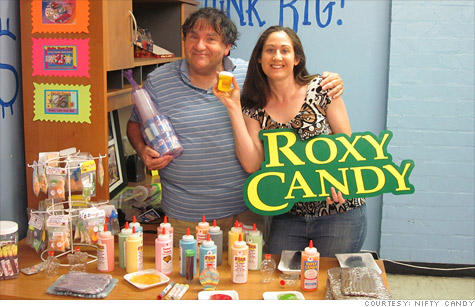Search News

Nifty Candy founders David and Roxy Klein show off their wacky wares, which include candy versions of cremation ashes, eye pus and blood samples.
(CNNMoney) -- It is every child's dream to own a candy company.
Roxy Klein eventually got her wish.
Today, the 33-year-old co-owns Nifty Candy with her father, David Klein, who invented the Jelly Belly jelly bean in 1976.
In addition to the Kleins, the company, based in Covina, Calif., employs three candy makers, three employees who pack orders and one assistant.
By July, 15 years after its founding, Nifty Candy had earned its first $1 million. "We had a party," said Roxy Klein. "It's one of those things where the pennies really do add up."
Wholesale orders -- to retailers like hospital gift shops, college bookstores, resorts and groups hosting fundraisers -- are typically between $100 and $600.
The wheels are constantly turning for the Kleins as they plot out new products. The average time from conception to market is one week. "We're not afraid to try new things," said Roxy Klein. This summer she launched candy powder in three cupcake flavors: "The 'vanilla cupcakes' are delicious. It tastes like a real cupcake," she said.
The candy is not always cute and adorable, however. "Uncle Urnie's Candy Ashes" (sour black-cherry candy powder packaged in a black velour sack), "blood samples" (cherry liquid in a vial), gummy bacon and eggs, and pink eye pus (sour cherry pink liquid candy) are examples of what's brainstormed and later executed inside Nifty Candy's 9,000-square-foot headquarters.
Rebecca Klein, who is Roxy's mother and David's wife, works in product development, while David Klein handles the orders and accounting. He also serves as a mentor to his daughter, who travels to trade shows and meetings with wholesale customers. "About 90 percent of the time I take his advice," said Roxy Klein.
Roxy came up with Sandy Candy, the company's very first product, during her senior year in high school. Customers fill thin tubes with finely ground "sand" in 88 wacky flavors, such as mocha chocolate, apple berry and cola blue.
"They're definitely on to something with the goofiness of the candy," said Beth Kimmerle, a candy expert and historian, and author of "Candy: The Sweet History," published by Collectors Press in 2007. "It reminds me of David's spirit in developing Jelly Belly. That whole genre is weird and wacky. For kids, the grosser it is, the better."
Yet with innovation comes increasing competition. Nifty Candy's biggest struggle is creating candies that are unlike anything else sold -- and difficult to copy. "You spend a lot of time developing this product," said Roxy Klein. "And to have something that replicates it entirely -- not only does it hurt your bottom line -- it hurts your ego."
The second challenge, she said, is the cost of doing business. When a wholesale client ups its retail prices, this translates to a smaller order.
"There has to be a middle line where you can keep the customer happy and also watch your bottom line," Klein said. Selling candy truly made in the United States and with domestic sugar is a core value at Nifty Candy. "We're proud of that fact. We wouldn't want to change that, even to save money. You're only as good as your last batch. You don't want to cheapen your ingredients."
Although she always knew she'd have a career in the candy business, Klein went to college for a marketing degree, and later a realtor license, so she'd have a job to fall back on. "I have enjoyed candy since I was a little girl," she said.
Watching her father develop ideas for candy inspired her own interpretations. At the age of three she brainstormed her first candy: Sweet Tarts in the shape of "choo-choo" trains.
"That's a great idea from anyone -- especially a three-year-old," said David Klein. Multi-generational candy companies like Nifty Candy are quite common in the industry, said Kimmerle, who noted that Mars and Tootsie Roll are still family-owned.
But what's different today are government regulations and labeling laws. "You need a lot more capital and a lot more eyes for labeling and distribution," Kimmerle said. "And you have to be ready to 'go, go, go' on a large scale."
Next up for the father-daughter duo is a gangrenous gummy foot -- complete with a toe tag. It's bound to cause a few snickers, but one thing's for sure: the candy will be in good company with all of Nifty's other creative concoctions. ![]()